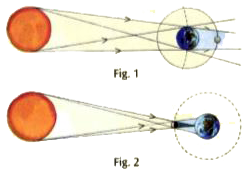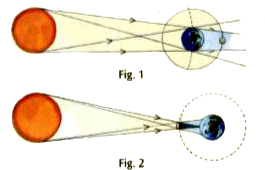Solar eclipse occur on a
New moon day
Half moon day
Full moon day
First quarter moon day
The correct Answer is:A
Step-by-Step Solution:
1. Understanding Solar Eclipse: A solar eclipse occurs when the Moon passes between the Earth and the Sun. This alignment blocks the Sun's light from reaching the Earth.
2. Positioning of Celestial Bodies: For a solar eclipse to happen, the Moon must be in a specific position relative to the Earth and the Sun. This position occurs during the New Moon phase when the Moon is directly between the Earth and the Sun.
3. Timing of Solar Eclipse: The solar eclipse is specifically observed on New Moon Day. This is the day when the Moon is not visible from Earth because it is in the same direction as the Sun.
4. Other Lunar Phases:
- During the Half Moon Day (First Quarter), the Moon is at a 90-degree angle to the Earth and Sun, and a solar eclipse cannot occur.
- On Full Moon Day (Purnima), the Moon is on the opposite side of the Earth from the Sun, making it visible and again preventing a solar eclipse.
5. Conclusion: Therefore, a solar eclipse occurs on New Moon Day when the Moon is positioned between the Earth and the Sun.
Final Answer: A solar eclipse occurs on New Moon Day.
---
- During the Half Moon Day (First Quarter), the Moon is at a 90-degree angle to the Earth and Sun, and a solar eclipse cannot occur.
- On Full Moon Day (Purnima), the Moon is on the opposite side of the Earth from the Sun, making it visible and again preventing a solar eclipse.
Similar Questions
Knowledge Check
Following eclipsed form of propane is repeated after rotation of:
 A60∘B120∘C180∘D360∘
A60∘B120∘C180∘D360∘

Which celestial object is responsible for blocking the light of the sun during
i.a solar eclipse and ii.a lunar eclipse.
View SolutionDuring a solar eclipse, the sun's light is blocked for some time.
View SolutionThe change in the value of acceleration of earth toward sun, when the moon coomes from the position of solar eclipse to the position on the other side of earth in line with sun is :
(mass of moon =7.36×1022 kg, orbital radius of moon =3.8×108 m.)
View SolutionAt the time of total solar eclipse, the spectrum of solar radiation would be
View Solution
When does a solar eclipse take place?
View SolutionExplain lunar and solar eclipses with the help of diagrams.
View SolutionAssertion : Photodiode and solar cell work on same mechanism.
Reason : Area is large for solar cell.
View Solution
